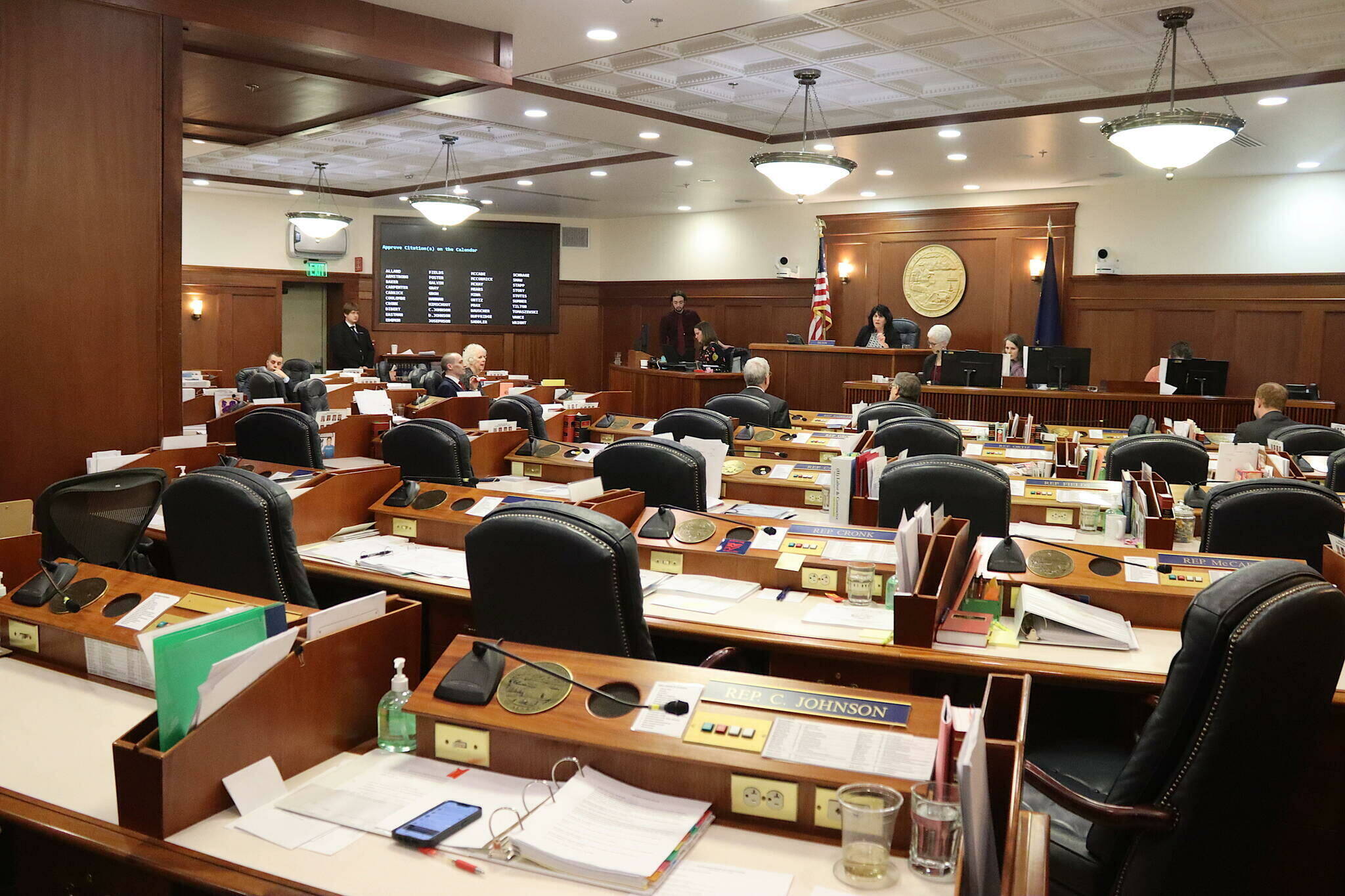What was expected to be a long day in the Alaska House of Representatives of debate on a massive education bill fell short Monday after the chamber failed to get the number of votes necessary to bring the legislation forward for consideration.
Under the gaze of the students and education advocates sitting in the House galleries as guests, House members voted 20-20 on whether to consider, debate and amend the version of the Senate Bill 140 advanced by the House Rules Committee. A tie vote killed potential consideration, thwarting what many expected to be a long day of discussion.
Lawmakers went into an hours-long recess that included closed-door meetings between lawmakers. The day ended with no further action and adjournment until Tuesday morning.
Included in the version of the bill considered by the House on Monday were a $300 increase to the amount of money the state gives school districts per student, also called the Base Student Allocation, and lump sum bonuses for eligible certified teachers, in addition to numerous other initiatives championed by Gov. Mike Dunleavy. Dunleavy has said he will not sign a standalone increase to the Base Student Allocation, which has not noticeably budged since 2017.
The same version of the bill would also direct the Alaska Department of Education and Early Development to collaborate with the Alaska Department of Labor and Workforce Development to collect data on high school graduating classes, and allow people interested in starting a new charter school to directly petition the State of Alaska, rather than their local school board.
Before gaveling in on Monday, representatives were said to be considering dozens of amendments to the bill. Those opposed to considering the legislation on Monday said it had changed drastically from its initial iteration and said some elements subverted the legislative process by incorporating initiatives introduced independently.
House Minority Leader Calvin Schrage, from Anchorage, called the version of the legislation being considered by House members on Monday a “Frankenstein’s monster of a bill.” He criticized the appendage of individual education initiatives to the bill and said some of those initiatives are still being considered independently in committees.
“This proposal is unrecognizable, does not follow the proper processes and is not fit to be on the floor for debate,” Schrage said.
Those in favor of debating the legislation said it would provide timely and needed financial relief to Alaska’s school districts, though the increase in the funding formula was about one-quarter of what public school advocates have been pushing.
Rep. Craig Johnson, R-Anchorage, chairs the House Rules Committee, and said that while is still sufficient time left in the current legislative session to pass a bill, Alaska’s school districts are being forced to make tough choices now. At one point, Johnson waived a white piece of paper in the air, comparing the action to the message sent by the failure to adopt.
“To stop now is to surrender and I’m not prepared to surrender,” Johnson said.
Rep. Justin Ruffridge, R-Soldotna, wanted to consider the bill Monday, telling the body that he came “ready to do work.”
“I think it’s incumbent upon us to take action and take action at some point in the very near future, preferably today, on some sort of fix, some sort of resolution for the people who have asked us to come here and do work while we were elected,” he said.
Incorporated into the version of the bill that was to be considered were two initiatives introduced independently by Ruffridge.
The first, introduced as House Bill 139, would fund school districts at the same level for correspondence students, such as homeschooled students, as students who attend brick-and-mortar schools. The second, introduced as HB 144, would make permanent a tax credit program that encourages businesses to make charitable contributions to schools. Currently that program must be regularly renewed.
The House chambers on Monday evening were mostly empty when representatives reconvened at about 5:30 p.m.
House Speaker Cathy Tilton, R-Wasilla, after the floor session adjourned, attributed Monday’s sequence of events to the scale of the legislation, and to a desire for House and Senate leadership groups to discuss how best to advance the bill.
“I don’t think the plan went off the tracks,” she said. “I think that in this kind of a bill with this big of a policy, and as much policy as there is, people are just trying to figure out where they’re at with it.”
Members of the House minority have said they felt left out of the negotiating process that produced the iteration of the bill moved out of the House Rules Committee.
Johnson said he was surprised that members of the House Bush Caucus, a group of lawmakers that advocate for the unique needs of rural Alaska, didn’t want to take up the current iteration of the bill.
“It was a disappointment, (but) we just go on,” he said.
The House is scheduled to reconvene Tuesday morning and pick up where they left off.
SB 140 originated as a bill to provide faster broadband service to rural schools by using state money and a federal match to increase the minimum internet speed in state schools from 25 to 100 megabits per second. The state must submit forms for the federal grant funding by the end of this month, prompting some legislators to emphasize the necessity of passing at least that provision either in SB 140 or a separate bill.
Johnson declined to say if he will prioritize the internet provisions in some form if the vote to take up SB 140 on Tuesday fails.
“That’s a bridge we’ll cross when we get to it,” he said.
Reach reporter Ashlyn O’Hara at ashlyn.ohara@peninsulaclarion.com. This reporting from the Alaska State Capitol was made possible by the Alaska Center for Excellence in Journalism’s Legislative Reporter Exchange.

